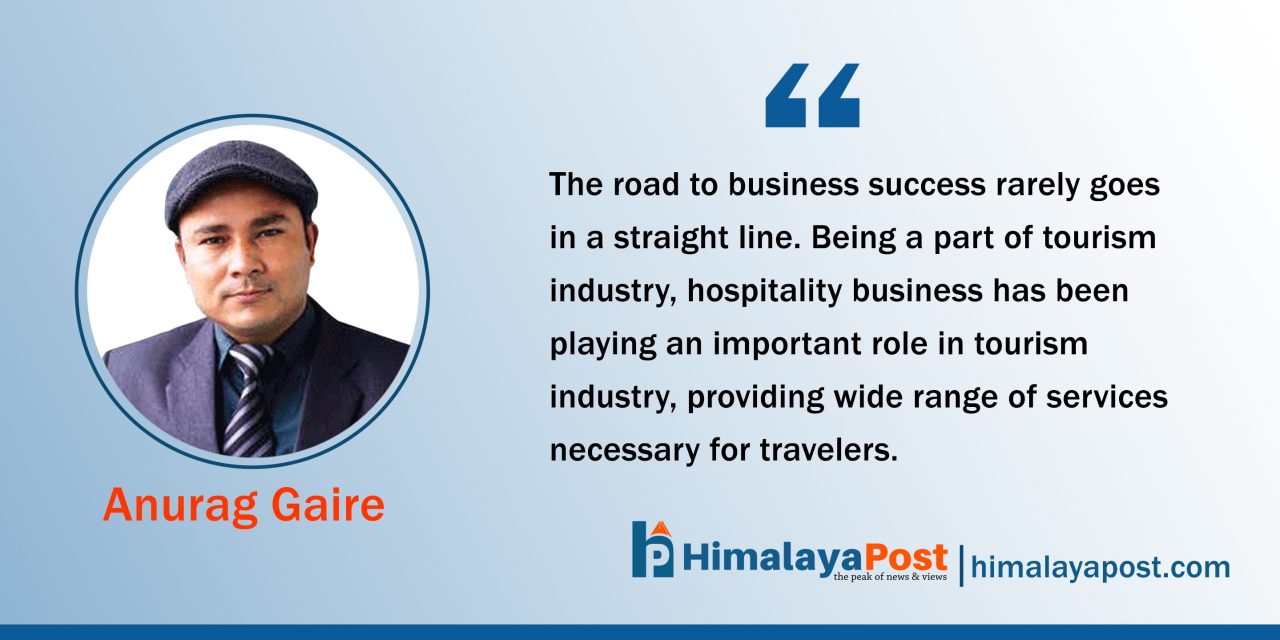– Anurag Gaire
Entrepreneurship is the act of starting a business in the hope of earning a profit. However, our modern perception of entrepreneurship has evolved into recognizing its ability to solve large-scale problems and influence social change. Entrepreneurs may also become thought leaders in their fields, although this isn’t necessarily a distinguishing factor of someone in this role, but it can be a natural outcome. Entrepreneurship itself is an act of taking risks. It requires a unique set of skills including self-determination, self-motivation, and perseverance.
Whether you’ve conceptualized a solution to a known problem or you’ve simply decided to work for yourself. In the same way, hospitality entrepreneurship requires foundational leadership and assessing skills to create economic and social value either for a startup or as part of an entrepreneurial team within a hospitality organization. Society is constantly evolving and the hospitality sector is along with it. New concepts can take over and disrupt markets in a very short period of time. Talking about the hospitality industry, there is no doubt that, this industry is the largest and fastest-growing industry that emphasizes on service and guest satisfaction.
Hospitality industry consists of a patchwork of hotels, restaurants and resorts, the great majority of which are operated by individuals or families, or maybe a small group of investors. This industry particularly lends itself to entrepreneurship. Every property, whether it’s a restaurant or a hotel, has its own specific market characteristics which are determined by its location and by the services on offer. Understanding the local market is the key to success and requires an entrepreneurial mind set in order to succeed.
Those who found their own businesses need to be ‘jacks-of-all trades’. They must master and be able to successfully perform a wide variety of tasks. For instance, besides the basic hospitality skills like preparing and serving food and beverage and managing hotel accommodation, hoteliers need to understand something about architecture, construction, legal and regulatory aspects, IT, marketing, social media, human resources management, accounting, finance, revenue management, etc. but most of all, hospitality entrepreneurs need to possess dogged determination and persistence. An entrepreneur must also be ready to accept failure as a learning experience.
The road to business success rarely goes in a straight line. Being a part of tourism industry, hospitality business has been playing an important role in tourism industry, providing wide range of services necessary for travelers. Especially the chain hotels and restaurants are contributing for hospitality to be an industry. You may think that, since nowadays, the hotel industry is dominated by the big chains, like Marriott Hilton and Accor Hotels, etc. that there’s no more room for the entrepreneurial spirit. It should be noted these great hotel companies trace their origins to entrepreneurs.
Travelling and eating is part of human life since the beginning of human civilization and as we all know that people will never stop eating and travelling, there is always a room for new hospitality business. Traditionally the performance of hospitality organizations has been studied from the point of destination brand/reputation, attractions infrastructure, and services. However, recently a number of hospitality scholars have seen entrepreneurship and innovation as having a critical role in shaping this global industry and have advocated for further research.
Entrepreneurial activities have been examined as an antecedent of growth, competitive advantage and superior performance. Despite the rising interest in entrepreneurial activities, the contemporary hospitality literature proposes that the field is lacking of strong theoretical frameworks related to this essential entrepreneurial orientation.
The inherent multi-experiential nature of hospitality firms requires an entrepreneurial mindset to seek, and capture, the opportunities to offer unique experiences to travelers, hospitality is one of the main economics antecedents of a great number of nations and entail a multitude of services, facilities and attractions that create many entrepreneurial opportunities. The arrival of emergent players in the lodging services has put even more pressure on the tourism and travel industry. This industry is rapidly changing. Such dynamic and uncertain environments require hospitality firms to strengthen their abilities to be innovative, proactive and risk taking.
Dynamism of the environment can be conceptualized as the rate of change and the magnitude of unpredictability, e.g. alteration in technologies, variations in consumer preferences and market demands. The impact of firm’s resources, capabilities and competencies on a firm’s behavior and operations are reliant on these environmental dynamism cues. As competition increases and customer preferences change, a faster pace evolves and the environment becomes more dynamic. As a result, the development stage from product introduction to withdrawal becomes shorter.
The introduction of new tangible and intangible goods is more frequent; information becomes outdated quicker. Thus, it is more complicated and difficult for firms to assimilate and predict environmental conditions, to discover the possible effects of innovative technological changes on consumer needs and behavior, and to explain them into specific and relevant activities. For example, the arrival of Airbnb, OYO, a fast-paced business gradually disrupting the hospitality industry and creating a dynamic and competitive new operating environment. Such competitive pressure coupled with fluctuating tourism demand and low levels of service differentiation among lodging industry has created an intensification of pressure on management to devise novel approaches for beating rivals.
Having said that it is very important to be dynamic and adapt new technology. At the same time, when you are an entrepreneur in any industry, networking is the key. Network ties can be viewed from the point of business or social relationships. Entrepreneurial firms utilize business networking as a vehicle to connect more with each other counterparts to enhance efficiency operation. Business network ties are recognized as key facilitators of the effectiveness and efficiencies of entrepreneurial strategic orientation activities to capture emerging business opportunities. World-class organizations are able to create dynamic processes through strong network ties that foster accelerated information flows along with other capabilities providing sustainable competitive position in the global market.
Entrepreneurship is risky, but it’s also rewarding. Not everyone has what it takes to start and run their own venture. But if you are self-motivated, creative, resourceful and undeterred, you’re ready to reap the benefits. At its core, entrepreneurship is about taking risks and working hard in the name of solving problems. As the hospitality entrepreneur, you’ll learn how to be a critical thinker and focus on coming up with unique solutions as an agent of change. Using your creativity, you’ll also be able to improve upon existing services or products and better address the public’s needs.
Hospitality entrepreneurs bring new jobs and wealth to economies through a domino effect. When a new and innovative business idea is introduced, the market begins to shift and other companies follow suit, creating competition. When a product or service becomes a need, job creation is an inevitable outcome as there is a higher demand for the product. That need requires further resources, wealth and investments, resulting in positive economic growth.
(Gaire is the BHM Program Coordinator of Global College International)





